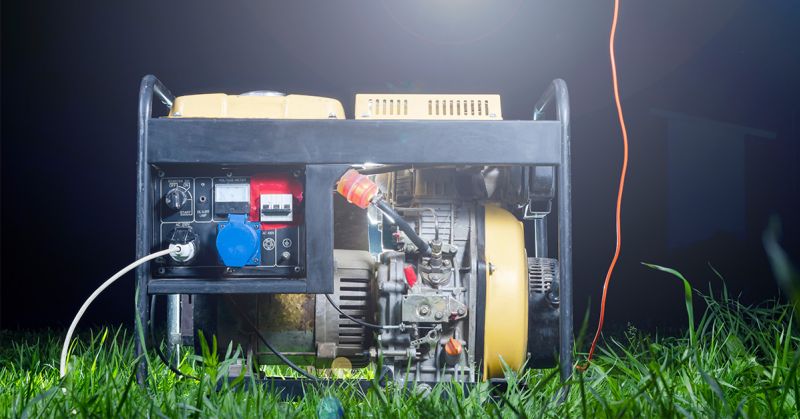
It’s Peak Hurricane Season in Tallahassee—Install Your Generator Today!
It may have seemed like an exceptionally calm hurricane season for Florida this year, but tropical storm activity started ramping up in the second half of September. Since September and October are considered part of the state’s peak hurricane season, residents should pay close attention to the weather and have a hurricane preparation plan in place. Note that 40% of all hurricanes that make a U.S. landfall impact Florida and that the Tallahassee area has weathered almost 60 tropical storms since 1930.
Because widespread and long-lasting power outages are an inevitable impact of hurricanes, equipping your home with a generator gives you top-level storm preparation. At a minimum, a generator can keep some lights on, preserve food in the refrigerator, and let you charge mobile devices. Larger generators can power much more, with some able to power the entire home.
The electrical experts at Tallahassee’s Meeks Electrical Services know all about generators and can help you pick and install the right size generator for your hurricane preparation needs. Read on to learn more about what a generator can do for your home should a hurricane knock out Tallahassee’s power grid.
Choosing the Right Generator for Your Needs
When choosing the right generator for your household’s emergency power needs, you’ll need to consider type, size, and wattage, among other factors. “Type” covers portable versus standby, fuel source, and inverter generators. Size and wattage roughly correspond with each other, as larger generators produce more wattage. Let’s examine your options:
Home standby generators are the best option to ensure complete peace of mind and coverage of all your home’s electrical needs. Also known as “whole-home” generators, a standby generator is professionally installed, fixed machinery directly connected to your home’s circuit breaker. Automatic transfer switches turn these generators on whenever the house loses power from the grid. The home’s daily electrical needs dictate the size and wattage of your standby generator, and fuel options include natural gas, propane, diesel, and dual fuel systems. Standby generators are designed to deliver uninterrupted power for weeks and are the best option for reliable powering of central air conditioning systems.
Small portable generators represent the other end of the generator spectrum. As implied by the name, portable generators can be moved to wherever needed. Power cords from the home can be plugged into the generator, and many allow for a direct connection to the home’s circuit panel with a manual transfer switch, which should be pre-installed by a professional electrician.
Small portable generators provide less than 3,000 watts of electricity, enough to power some lights and the refrigerator, sump pump, or other moderate-draw appliance. These smaller generators are not designed to run multiple appliances consistently, and the more you try to use the more likely you’ll experience circuit breaks and the quicker you’ll exhaust the generator’s fuel.
Medium portable generators provide from 3,000 to 6,000 watts and can effectively power more appliances for longer periods. Due to their size, large and extra-large portable generators are more semi-fixed than they are “portable,” and should be connected to the home’s electrical panel with a manual transfer switch.
Large generators provide 6,000 to 9,000 watts, which can power multiple rooms and most appliances, except hardwired equipment that require high levels of surge watts, such as central air conditioners and well pumps. Offering more than 10,000 watts of power, extra-large portable units may be able to power all your appliances and hardwired equipment. The experts at Meeks Electrical Services believe that those considering this option should invest in the more long-term benefits of a standby generator.
Protect Your Sensitive Electrical Devices
When considering your generator options, know that the power produced by some generators can damage sensitive electronic devices like computers, cell-phone chargers, and high-tech appliances. To protect sensitive electronics, you’ll need a portable generator that produces less than 5% of total harmonic distortion. Portable inverter generators (as well as standby models) meet this standard and are lighter, quieter, and more fuel efficient than standard portable generator types. While more costly than traditional generators, we believe their benefits justify the additional costs.
Generator Operation and Safety Considerations
If you opt for a professionally installed standby generator, ensuring adequate fuel supplies for the duration of operation will be your primary consideration. Fuel will also be a primary concern if you opt for a portable generator, but you will also need to account for the load you are putting on it and safe operation. Putting too much demand on small and mid-size generators may cause a circuit break, inefficient power, and rapid fuel depletion. Concerning safety, portable generators should always be kept at least 10 feet away from doors and windows to prevent deadly carbon monoxide from entering the home. Additionally, you should never refuel a generator while it is running and always let it cool down before adding fuel.
Contact Meeks to Discuss Your Home Generator Options
To prepare your Tallahassee-area household for peak hurricane season and the potential power disruptions it may bring, consult with the residential technicians at Meeks Electrical Services. Our experts can assess your home energy needs and discuss viable generator options designed to meet these needs and your budget.
For all residential and business electrical needs in the Tallahassee area, contact Meeks today at (850) 575-5241.